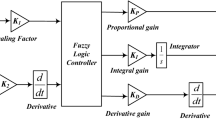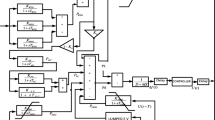Abstract
The intensifying progression in the transformation of the power grid towards a new generation power system introduces frequency regulation challenges in operations which can be overcome with substantial benefits from the latest robust control approaches along with suitable smart optimizing tools. Additionally, with the adoption of smart and intelligent control schemes, the latest communication technologies with the extensive placement of smart devices, there will be significant growth in real-time system measurements. Under this trend, an adaptive fuzzy PID (A-FLC-PID) system will play a vital role in reducing transient time. In this article, a novel adaptive fuzzy control architecture intended for load frequency control with a supplementary hybrid moth flame optimization pattern search (h-MFO-PS) algorithm is presented. The proposed approach is designed to optimize the controller gains for the eventual fitness of the objective function. The hybrid algorithm smartly updates the scaling factors of the adaptive fuzzy controller by considering various proportional and integral thresholds. Simulations are performed on two areas hydrothermal system with the gas unit. To validate the research outcomes and measure the effectiveness of the proposed architecture, the outcomes are compared with recent research approaches and practicability is tested using an OPAL-RT setup. The sturdiness of the concerned approach is studied with a wide range of parameterization and loading conditions. It is observed that the h-MFO-PS scaled A-FLC-PID controller establishes superior improvement in frequency regulation.















Similar content being viewed by others
Explore related subjects
Discover the latest articles, news and stories from top researchers in related subjects.References
Elgerd OI, Fosha CE (1970) Optimum megawatt-frequency control of multiarea electric energy systems. IEEE Trans Power Appar Syst 89(4):556–563
Elgerd OI, Happ HH (1972) Electric energy systems theory: an introduction. IEEE Trans Syst Man Cybern SMC-2(2):296–297
Kundur P (2009) Power system stability and control. Tata McGraw, New Delhi
Das D, Aditya SK, Kothari DP (1999) Dynamics of diesel and wind turbine generators on an isolated power system. Int J Electr Power Energy Syst 21(3):183–189
Saikia LC, Nanda J, Mishra S (2011) Performance comparison of several classical controllers in AGC for multi-area interconnected thermal system. Int J Electr Power Energy Syst 33(3):394–401
Ismayil C, Kumar RS, Sindhu TK (2015) Optimal fractional order PID controller for automatic generation control of two-area power systems. Int Trans Electr Energy Syst 25(12):3329–3348
Saikia LC, Sinha N, Nanda J (2013) Maiden application of bacterial foraging based fuzzy IDD controller in AGC of a multi-area hydrothermal system. Int J Electr Power Energy Syst 45(1):98–106
Mishra S, Prusty RC, Panda S (2020) Design and analysis of 2dof-PID controller for frequency regulation of multi-microgrid using hybrid dragonfly and pattern search algorithm. J Control Autom Electr Syst 31:813–827
Wang C, Mi Y, Fu Y, Wang P (2018) Frequency control of an isolated micro-grid using double sliding mode controllers and disturbance observer. IEEE Trans Smart Grid 9(2):923–930
Nayak PC, Prusty U, Prusty RC, Barisal A (2018) Application of SOS in fuzzy based PID controller for AGC of multi-area power system. In: 2018 IEEE conference on technologies for smart-city energy security and power, vol 1, pp 1–6
Bevrani H, Daneshmand P (2012) Fuzzy logic-based load-frequency control concerning high penetration of wind turbines. IEEE Syst J 6(1):173–180
Nayak PC, Sahoo A, Balabantaraya R, Prusty RC (2018) Comparative study of SOS & PSO for fuzzy based PID controller in AGC in an integrated power system. In: 2018 IEEE conference on technologies for smart-city energy security and power (ICSESP), vol 1, pp 1–6
Nayak P, Prusty R, Panda S (2021) Grasshopper optimization algorithm optimized multistage controller for automatic generation control of a power system with FACTS devices. Prot Control Mod Power Syst 6(8):1–15
Nayak PC, Prusty UC, Prusty RC, Panda S (2021) Imperialist competitive algorithm optimized cascade controller for load frequency control of multi-microgrid system. Energy Sour Part A Recovery Util Environ Eff. https://doi.org/10.1080/15567036.2021.1897710
Nayak PC, Mishra S, Prusty RC, Panda S (2020) Performance analysis of hydrogen aqua equalizer fuel-cell on AGC of Wind-hydro-thermal power systems with sunflower algorithm optimized fuzzy-PDFPI controller. Int J Ambient Energy 43:1–14
Nayak PC, Nayak BP, Prusty RCPS (2021) Sunflower optimization based fractional order fuzzy PID controller. Energy Sour Part A Recovery Util Environ Eff. https://doi.org/10.1080/15567036.2021.1953636
Abd-Elazim S, Ali E (2016) Load frequency controller design via BAT algorithm for nonlinear interconnected power system. Int J Electr Power Energy Syst 77:166–177
Sinha SK, Patel RN, Prasad R (2010) Application of GA and PSO tuned fuzzy controller for AGC of three area thermal- thermal-hydro power system. Int J Comput Theory Eng 2(2):238
Nayak PC, Patel S, Prusty RC, Panda S (2019) MVO-PS optimized hybrid FOFPID controller for load frequency control of an AC micro-grid system. Int J Recent Technol Eng (IJRTE) 8(2):3805–3812
Arya Y, Kumar N (2017) BFOA-scaled fractional order fuzzy PID controller applied to AGC of multi-area multi-source electric power generating systems. Swarm Evol Comput 32:202–218
Sahu BK, Pati S, Panda S (2014) Hybrid differential evolution particle swarm optimisation optimised fuzzy proportional–integral derivative controller for automatic generation control of interconnected power system. IET Gener Transm Distrib 8(11):1789–1800
Ang KH, Chong G, Li Y (2005) PID control system analysis, design, and technology. IEEE Trans Control Syst Technol 13(4):559–576
Demiroren A, Yesil E (2004) Automatic generation control with fuzzy logic controllers in the power system including SMES units. Electr Power Energy Syst 26(4):291–305
Parmar K, Majhi S, Kothari DP (2012) Improvement of dynamic performance of LFC of the two area power system: an analysis using MATLAB. Int J Comput Appl 40(10):28–32
Li H-X, Gatland HB (1996) Conventional fuzzy control and its enhancement. IEEE Trans Syst Man Cybern Part B (Cybern) 26(5):791–797
Fereidouni A, Masoum MA, Moghbel M (2015) A new adaptive configuration of PID type fuzzy logic controller. ISA Trans 56:222–240
Savran A, Kahraman G (2013) A fuzzy model based adaptive PID controller design for nonlinear and uncertain processes. ISA Trans 53(2):280–288
Mirjalili S (2015) Moth-flame optimization algorithm: a novel nature-inspired heuristic paradigm. Knowl-Based Syst 89:228–249
Author information
Authors and Affiliations
Corresponding author
Additional information
Publisher’s Note
Springer Nature remains neutral with regard to jurisdictional claims in published maps and institutional affiliations.
Appendix
Appendix
2-area-6-unit power system network parameters under consideration are given below:
f = 60 Hz | B1 = B2 = 0.425pu MW/Hz | PR = 2000 MW | PL = 1840 MW | R1 = R2 = R3 = 2.4 Hz/pu MW |
|---|---|---|---|---|
Tsg = 0.08 s | Tr = 10 s | Kr = 0.3 | Tt = 0.3 s | KT = 0.543478 |
KH = 0.326084 | KG = 0.130438 | Tgh = 0.2 s | Trh = 28.75 s | Trs = 5 s |
Tw = 1 s | bg = 0.5 | cg = 1 | Xc = 0.6 s | Yc = 1 s |
Tcr = 0.01 s | Tfc = 0.23 s | Tcd = 0.2 s | Tps = 11.49 s | Kps = 68.9566 |
T12 = 0.0433pu | a12 = − 1 |
Rights and permissions
Springer Nature or its licensor (e.g. a society or other partner) holds exclusive rights to this article under a publishing agreement with the author(s) or other rightsholder(s); author self-archiving of the accepted manuscript version of this article is solely governed by the terms of such publishing agreement and applicable law.
About this article
Cite this article
Nayak, P.C., Prusty, R.C. & Panda, S. Adaptive fuzzy approach for load frequency control using hybrid moth flame pattern search optimization with real time validation. Evol. Intel. 17, 1111–1126 (2024). https://doi.org/10.1007/s12065-022-00793-0
Received:
Revised:
Accepted:
Published:
Issue Date:
DOI: https://doi.org/10.1007/s12065-022-00793-0




